Office Waste Management
Save on office waste collection quotes today
Just enter your offices postcode…
Save on office waste collection quotes today
Just enter your offices postcode…
As businesses strive to streamline operations and reduce their ecological footprint, managing office waste is a critical priority.
Effective office waste management minimises landfill waste, ensures compliance with regulatory standards and reduces overall business waste collection costs.
This guide explores the importance of commercial waste collection and disposal strategies and their benefits for businesses and the environment.
We cover the following subjects in detail:
We uncover the full spectrum of materials that offices produce, from the everyday churn of paper and cardboard to the less visible but equally significant organic, sanitary, and general waste.
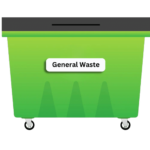
General waste includes various non-recyclable or residual items that cannot be composted or recycled. This includes mixed materials such as used tissues, and styrofoam.
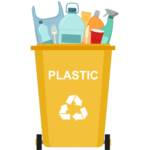
In an office environment, commercial plastic waste includes bottles, packaging materials, and office supplies, including pens and markers. Plastic waste is generated through bottled beverages, the packaging of office supplies, and the disposal of used or broken plastic items.

Paper and cardboard waste in an office environment consists of used office paper, packaging materials, and cardboard boxes. Daily office activities such as printing, copying, and packaging deliveries are huge contributors.
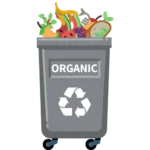
Organic waste in an office environment includes plant trimmings or compostable materials from office plants or outdoor areas.
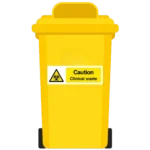
Categorised under “offensive/hygiene waste”, – sanitary waste encompasses menstrual hygiene products and other waste related to human activities. It includes solid or liquid waste that, while not known to be infectious, may be unpleasant due to its appearance and smell.

Furniture waste in an office environment comprises broken or outdated furniture such as chairs, desks, and cabinets. Furniture waste disposal often involves removing and replacing new furniture, and the discarded items are sent to landfills or recycling centres.
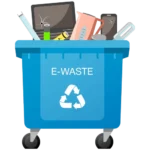
Electronic waste (e-waste) comprises obsolete or non-functional electronic devices, including computers, monitors, printers, keyboards, and photocopiers. Electronic waste disposal requires proper handling to prevent environmental contamination and data security risks.
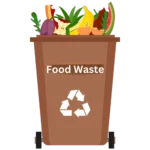
Food waste typically consists of leftover food, food past its expiry date, and uneaten snacks from communal areas. Employees must discard unfinished meals, snacks, or items past the expiry date, causing waste to accumulate.
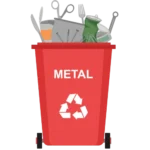
Tins and cartons waste typically includes canned beverages, food products, and packaging materials such as tin cans and cardboard cartons. Employees may discard empty cans and cartons after consuming their contents, contributing to the generation of this type of waste.
Waste solutions to benefit your office’s waste management strategy.

Confidential waste collection offers a secure and efficient solution to protect your office’s sensitive information, ensuring it is safely disposed of and safeguarded against potential breaches.

Introducing a food waste collection service in your office will effectively manage leftover and spoiled food, significantly reducing waste and supporting your company’s commitment to environmental sustainability.

Dry mixed recycling simplifies the process of segregating recyclables in your office. It allows for the efficient collection of paper, plastics, metals, and glass in one single container.
Dive into the heart of office waste management practices with our comprehensive guide to waste management strategy. Explore the relative commercial bin types placements and understand collection times to ensure your waste process throughout your office runs smoothly.

These are typically colour-coded and used for collecting recyclable materials such as paper, plastic, glass, and aluminium—position recycling bins near printers, photocopiers, and communal workspaces in high-traffic areas.
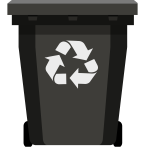
General waste bins are designated for non-recyclable or residual waste items that recycling processes can’t deal with. Commonly stationed alongside recycling bins; they’re essential for the disposal of non-recyclable plastics and a broad spectrum of general office waste.

Composting bins are designed for the eco-conscious disposal of organic waste, including food scraps, coffee grounds, and plant trimmings. Ideally stationed in kitchenettes or breakrooms—where such waste predominantly originates.

Sanitary waste bins are specialised containers designed for the discreet and hygienic disposal of sanitary waste, such as menstrual hygiene products, incontinence pads, and similar items.
These bins are typically slim, foot-operated or sensor-operated to minimise contact, ensuring a higher level of hygiene. In an office setting, sanitary waste bins are within individual toilet cubicles.

These bins collect sensitive or confidential documents that require secure disposal. They are often equipped with locking mechanisms or are placed in secure areas to prevent unauthorised access to confidential information.

Paper shredding bins play a crucial role in offices. They are specifically designed to collect documents requiring secure destruction. Positioned strategically near printers, photocopiers, or document storage areas, they facilitate the easy disposal of sensitive information, ensuring it is properly shredded before recycling.

Battery recycling bins are a vital addition to offices, dedicated to collecting used batteries for recycling. By safely disposing of batteries in these bins, offices prevent them from reaching landfills where they could release harmful chemicals into the environment—strategically placing these bins in easily accessible spots, such as near entrances and communal workspaces.

E-waste bins are designed to collect outdated or non-functioning electronic devices like computers, monitors, and printers. Store these bins in storage rooms and ensure they are accessible.
Determine how often you must arrange commercial waste collection for your office and the best practices for large waste bins.
Determine the number of bins within your office and measure how frequently they reach full capacity each day and their sizes.
Next, work out how often your office’s large bin, usually placed outside in the parking or facilities area, becomes full. This assessment will help you establish the optimal schedule for waste collections specific to your office’s needs.
Google unveiled plans for a ground breaking £1 billion campus in London, marking a significant milestone in their commitment to sustainability and innovation. This ambitious project aims to create a vibrant hub for tech and creativity, fostering collaboration and growth within the local community.
At the forefront of Google’s vision is a sustainable and environmentally conscious design featuring cutting-edge green technologies and renewable business energy solutions.
Here are some key sustainable features of their state-of-the-art sustainable paradise:
Google’s new campus aims to redefine the future of work and urban development.
Our experts answer your questions surrounding office waste management.
Yes, there are strict restrictions on hazardous waste disposal in office settings governed by environmental regulations and health and safety laws.
Hazardous waste includes batteries, electronics (e-waste), fluorescent bulbs, and certain cleaning chemicals, which cannot be disposed of alongside general commercial waste due to their potential harm to the environment and human health.
To address missed collections or request repairs for damaged bins in your office, promptly contact your waste management provider with specific details of the issue.
For missed collections, include the scheduled collection date and bin accessibility; for damaged bins, describe the damage and, if possible, provide photographs.
After reporting, obtain a confirmation or reference number and inquire about the resolution timeline. Should the issue remain unresolved within this period, follow up with your provider, keeping a record of all communications for future reference.
County councils implement local regulations on the storage and disposal of commercial waste.
For more details of local regulations, visit our commercial waste pages in the UKs key commercial hubs:
Source: Wikipedia – cities by GVA